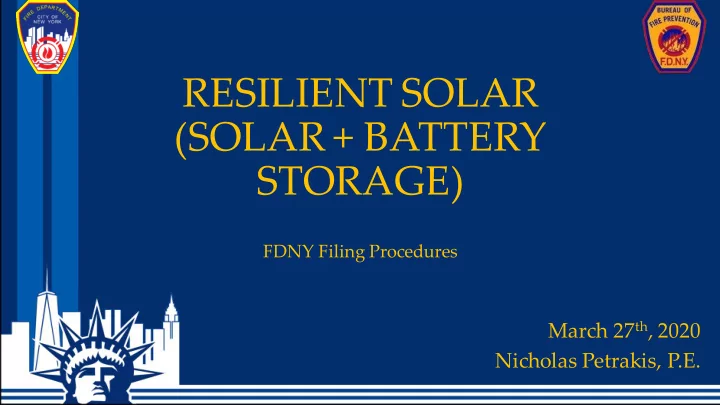

RESILIENT SOLAR (SOLAR + BATTERY STORAGE) FDNY Filing Procedures March 27 th , 2020 Nicholas Petrakis, P.E. 1
RESILIENT SOLAR (SOLAR + STORAGE) • CUNY in conjunction with FDNY has drafted permitting process guidelines for Valve-Regulated Lead Acid (VRLA) and Outdoor Lithium Ion (available online) • Other chemistries will follow similar procedure, but pertinent information will vary based on technology • Each application evaluated on site by site basis FDNY Outdoor Stationary Storage Battery Systems 2
INFORMATION AND SUPPORTING DOCUMENTATION Things that need to be considered: • Size (what’s needed and what hazards that would pose) • All nearby exposures • Gas Hazards (Toxicity and Deflagration) • Fire Protection Systems • FDNY connections? • FDNY response? (clean agent and water) • Certificate of Fitness Holder and SME • Emergency Response Shutdown Emergency signals Actual emergencies • Vehicles • Disposal of the ESS 3
FILING AN APPLICATION (CAN BE SUBMITTED IN PARALLEL WITH DOB) • TM-1 Application • $420 + $525 ($945 total) examination fee • Plans Showing Proposed Location • Narrative for scope of work • Cut-sheets of system components • Installation manuals • UL Listings • Other pertinent information (CoA approval, etc.) 4
FILING AN APPLICATION CERTIFICATE OF APPROVAL – NEW EQUIPMENT • TM-2 Application • $625 examination fee • Cut-sheets of system components • Installation manuals • UL listing and certification (Listing to UL 9540, UL 1973, UL 1741 and other pertinent UL certifications) • UL 9540A Testing results an analysis. Certificate of approval is required for new equipment. To be submitted by equipment manufacturer or authorized agent. 5
TYPES OF APPLICATIONS • Outdoors VRLA, Li-ion, flow batteries, etc. Outdoor cells, cabinets and containers • Indoors VRLA and Lead Acid only www.Estelecomcabinet.com 6
REVIEW PROCESS Applicant submits all required paperwork Once submitted, the application will be reviewed by FDNY FDNY will contact the applicant to set up a joint site visit, conducted by Tech-Management and HazMat FDNY will notify applicant of decision; if approved, a Letter of No Objection will be issued *Approval shall be obtained from NYC Department of Buildings (DOB) and all other agencies having jurisdiction 7
INFORMATION AND SUPPORTING DOCUMENTATION Building Information • Building Construction type (Non-Combustible) • Building Use and Occupancy • Description of where ESS will be located (indoor, outdoor etc.) • Use of proposed ESS location (parking garage, etc.) • Available FDNY access to ESS • Description of Ventilation system for entire building and in direct vicinity of proposed ESS location *Requirements are subject to change 8
INFORMATION AND SUPPORTING DOCUMENTATION Building Fire Protection Systems • Description of water-based suppression system, and for location of ESS (may require additional protection depending on technology) • Standpipe hose outlet locations near installation • Emergency exit locations • Fire hydrant locations *Requirements are subject to change 9
INFORMATION AND SUPPORTING DOCUMENTATION ESS Description • System size (kWh and KW) • Applicable product standards met • Battery specific: • Number of Batteries • Battery Chemistry • Voltage • UL Listings (UL 1973, UL 9540 etc.) • Cascading Protection *Requirements are subject to change 10
INFORMATION AND SUPPORTING DOCUMENTATION • Battery Encasement: Number and type of racks Cabinet information (if provided) Ventilation for off gassing (if required) • Inverter: Size Type UL Listing Monitors for: over current, over temperature, etc. *Requirements are subject to change 11
INFORMATION AND SUPPORTING DOCUMENTATION • Battery Management System (BMS): • Description of system • Monitors for: battery voltages, temperatures, current, etc. • Safety measures: • Additional safety monitors not captured in the system description Ex. Hydrogen sensors, ground fault protection, etc. • Sequence of events if malfunction happens at battery or system level Explain how software detects malfunctions • Arc Fault Protection As per NEC 2014 *Requirements are subject to change 12
INFORMATION AND SUPPORTING DOCUMENTATION • Process to shut down system Rapid Shutdown As per NEC 2014 Location of Rapid Shutdown Switch Use of software to shut down List who has access to these systems • Specify any existing dangers Ex. Isolation of the system does not remove any charge present in the batteries. • Commissioning and De-commissioning plan *Requirements are subject to change 13
UNIT CONTACT INFORMATION Lead Engineer: Kam Chan Chief of TM: Chief Thomas Pigott HazMat: Chief Richard Schlueck Chief Michael Maiz Associate Project Manager : Nicholas Petrakis, P.E. Engineers: Ratan Roy, P.E Alexander Banc John Yacovone Yash Patel Tech Management Hotline: (718) 999 2405 Mailing Address: Fire Department of City of New York Bureau of Fire Prevention Technology Management 9 MetroTech Center, Third Floor, Room 3N-01 Brooklyn, NY 11201-3857 14
Recommend
More recommend